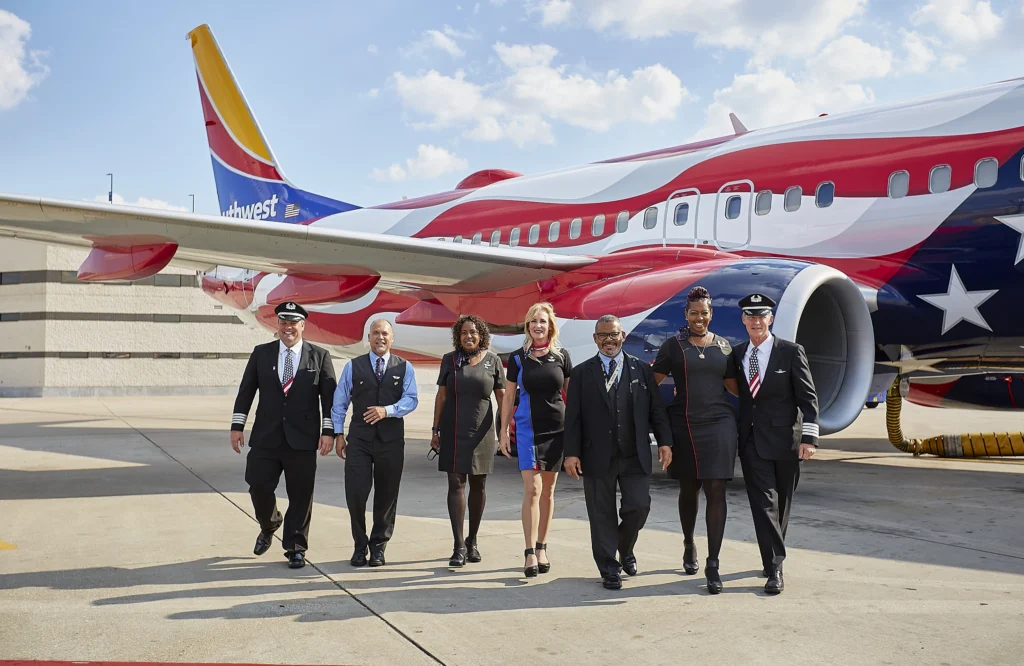
Introduction
In recent times, former Southwest Airlines flight attendant Bianca A. Hughley filed a substantial lawsuit against the airline, seeking $5 million in damages and her reinstatement. At the heart of her legal action are allegations ranging from wrongful termination to disability discrimination, hostile work environment, failure to accommodate, and violations of both federal and Maryland labor laws. The case has navigated both district and appellate courts, resulting in dismissals and ongoing appeals. This article delves deeply into the background, factual allegations, procedural developments, legal claims, and potential implications arising from the lawsuit.
Background and Parties
Who is Bianca Hughley?
Bianca A. Hughley was employed as a flight attendant by Southwest Airlines and based in Maryland. She began her association with the carrier during a post-pandemic hiring initiative, stepping into training around late 2021 and being stationed thereafter.
Contrastingly, Southwest Airlines, headquartered in Dallas, is a major U.S. domestic carrier known for its unique operational model and labor relations structure, including collective bargaining agreements that cover its flight attendants.
Key Events Leading to Litigation
Alleged Workplace Incidents and Employment Troubles
According to Hughley’s filed complaint in the United States District Court for the District of Maryland, the following events transpired:
- During her probationary employment, she allegedly received more than six customer appreciation letters but also endured persistent false accusations—such as using headphones aboard aircraft—that she had to continually defend against.
- On one occasion, she says she was “verbally and almost physically assaulted” by a White female co-flight attendant on a flight and later at a hotel. She says her supervisor, Katie McLaren, declined to remove her from the assignment and merely advised her to maintain cordial relations with the other attendant. An investigation was reportedly initiated by the assistant manager at BWI Airport, but she never received any follow-up or outcome regarding the matter.
- In August 2022, she called out sick to attend to a legal matter at the Baltimore County police station, citing protection under Maryland’s Sick and Safe Leave law. Shortly after, she was arrested and detained at the Baltimore County Detention Center.
- While incarcerated, she communicated with Ms. McLaren and was instructed to have a friend input schedule changes on her behalf—requiring her to share her username and password. After her release in November 2022, she discovered that a personal leave of absence had been granted from November 3 to November 13, 2022, without her request. During that leave, a fact-finding meeting was scheduled, which she could not attend, and then she was terminated for sharing her login credentials and failing to attend the meeting while on leave.
Legal Charge with the EEOC
Hughley filed a charge of discrimination with the U.S. Equal Employment Opportunity Commission (EEOC) on August 4, 2023, alleging race and disability discrimination. The EEOC dismissed the charge and provided her with a right-to-sue notice, prompting her to file suit in federal court.
Legal Claims Asserted in the Lawsuit
Hughley’s complaint, though self-represented, raised multiple claims:
- Breach of contract
- Hostile work environment
- Race-based wrongful termination
- Disability-based wrongful termination
- Failure to accommodate (under the ADA)
- Violation of the Maryland Healthy Working Families Act (Maryland Sick and Safe Leave)
District Court Proceedings and Ruling
Defendant’s Motion toDSouthwest filed a motion to dismiss her coismiss
mplaint, raising multiple deficiencies in Hughley’s pleading. The court granted the motion, dismissing most claims without prejudice and dismissing the breach- of-contract claim with prejudice due to Railway Labor Act preemption.
Analysis of Each Claim
- Breach of Contract (Railway Labor Act Preemption)
The court found this was a “minor dispute” under the Railway Labor Act (RLA) since it required interpretation of a collective bargaining agreement (CBA). Such disputes must go through arbitration per the RLA, not litigation. Accordingly, the breach claim was dismissed with prejudice. - Race-Based and Disability-Based Discriminatory Termination
The court found no direct evidence of discrimination. Hughley did not plead that similarly situated employHostile Work Environment
The court dismissed this claim without prejudice, noting that Hughley did not allege that the misconduct she experienced was based on her race or disability or that it was sufficiently severe or pervasive—required elements for a hostile-work-environment claim. Also, she had failed to exhaust this claim with the EEOC.
ees outside her protected classes were treated differently, nor did she sufficiently describe her disability or how it substantially limited major life activities, as required under the ADA. Both claims were dismissed without prejudice. - Failure to Accommodate
The court held that Hughley did not describe the nature of her disability, the specific accommodation she requested, or how it was denied—insufficient to state a plausible claim. This claim was also dismissed without prejudice. - Maryland Healthy Working Families Act Violation
The MHWFA allows private suits only after certain prerequisites: filing with the Maryland Commissioner of Labor and Industry, issuance of an order finding a violation, and the employer’s failure to comply with the order. Hughley did not show any such order or non-compliance. Moreover, she did not allege her police matter involved qualifying issues like domestic violence, sexual assault, or stalking. This claim was dismissed without prejudice.
Conclusion of District Court
The court granted Southwest’s motion to dismiss. All claims were dismissed without prejudice—except the breach-of-contract claim, which was dismissed with prejudice due to statutory preemption. Hughley was advised she could move to amend her complaint within thirty days if she wished to pursue viable claims.
Appellate Court Ruling (Fourth Circuit)
Hughley appealed to the U.S. Court of Appeals for the Fourth Circuit. On November 21, 2024, the Fourth Circuit issued an unpublished per curiam opinion, affirming the district court’s dismissal of her case and its refusal to allow amendment of her complaint. The appellate court also denied her request for court-appointed counsel.
Coverage and Context
Media and legal commentary further outline the case:
- Yahoo Finance reported that Hughley sought $5 million in damages and reinstatement.
- Aviation A2Z summarized that Hughley, a former MD-based flight attendant, sued Southwest for $5 million after being terminated.
- Moyles Law published a more narrative-style summary on July 11, 2025, noting she was hired around November 2021, terminated without grievance rights, and cited the RLA’s implications. It also emphasized her monetary and emotional damages claim and her desired reinstatement.
Additionally, the lawsuit is listed in PacerMonitor’s filing records under Labor – Railway Labor Act. PACERMonitor This underscores how the case is officially categorized and provides a procedural status.
Summary Table of Case Elements
| Aspect | Details |
| Plaintiff | Bianca A. Hughley, ex-Southwest flight attendant (Maryland) |
| Defendant | Southwest Airlines |
| Jurisdiction | U.S. District Court, District of Maryland; U.S. Court of Appeals, 4th Circuit |
| Filing Date | Following EEOC right-to-sue after August 4, 2023 |
| Alleged Wrongful Acts | Wrongful termination, hostile work environment, discrimination, failure to accommodate, contract breach, Maryland Sick & Safe Leave violation |
| Complaint Outcome (District Ct.) | Dismissed breach-of-contract (with prejudice), all others dismissed without prejudice |
| Appellate Outcome | Fourth Circuit affirmed dismissal and denial of amendment |
| Relief Sought | $5 million in damages; reinstatement |
| Key Law Impediment | Railway Labor Act arbitration requirement for CBA disputes |
| Status | Dismissed; no relief granted to Hughley |
Legal and Social Implications
Railway Labor Act Preemption
The case starkly illustrates how claims intertwining with collective bargaining agreements are often preempted by the RLA, forcing resolution through arbitration rather than litigation. Hughley’s breach-of-contract claim—stemming from her probationary employment and dispute arising under the CBA—fell squarely within this domain, resulting in its dismissal with prejudice. This underscores the limited recourse for employees under such arrangements, particularly during their probationary period.
Self-Representation and Procedural Challenges
Hughley was pro se (self-represented), which the courts acknowledged by construing her complaint liberally. Yet, courts still require factual and legal sufficiency—even pro se plaintiffs must plead coherent, detailed facts to support their claims. This case highlights the difficulties non-lawyers face in crafting claims that satisfy formal legal standards.
Disability and Accommodation Claims
The case demonstrates procedural pitfalls when asserting disability-related claims under the ADA: one must plausibly allege a qualifying disability (i.e., substantial impairment of major life activities), the nature of the accommodation sought, and how it was denied. Hughley’s general mention of “Diabetes/Hypertension” and lack of further details led to dismissal.
Workplace Conflict and EEOC Limitations
Her hostile-work-environment claim failed in part due to insufficient allegations connecting the mistreatment to race or disability, and her failure to raise such claims in the EEOC filing. This serves as a cautionary reminder: to preserve such claims, they must be clearly articulated during the EEOC process.
Maryland Sick and Safe Leave Misunderstandings
Hughley’s invocation of the Maryland Healthy Working Families Act highlighted the importance of compliance with statutory prerequisites—filing a complaint, obtaining a favorable order, and showing the employer’s non-compliance. Her failure to meet these steps thwarted that claim as well.
Looking Ahead
While the courts have dismissed Hughley’s efforts to date, the case remains notable for several reasons:
- It reflects systemic tension between employee rights and union-based dispute resolution systems under the RLA.
- It spotlights the challenges of self-representation in complex employment litigation.
- It illustrates procedural hurdles that can snuff out substantive claims if not pleaded with precision.
- It may influence other employees regarding awareness of rights during probationary periods and avenues of relief.
At this point, the Fourth Circuit has affirmed the dismissal, and there is no public indication of further appellate actions (e.g., to the Supreme Court). Unless new grounds emerge or amendment is granted (though denied by the appellate court), the lawsuit appears concluded without relief for Hughley.
Conclusion
The Bianca Hughley v. Southwest Airlines lawsuit presents a multifaceted case blending labor law, discrimination claims, procedural intricacies, and employee rights in a complex legal terrain. While her pursuit of justice through civil litigation is understandable—she sought reinstatement, compensation for lost income, emotional distress, and vindication of her rights—her case ran afoul of several statutory and procedural barriers.
Her breach-of-contract claim was blocked by the Railway Labor Act, her discrimination and hostile environment claims lacked sufficient factual basis and exhaustion, her failure-to-accommodate claim was devoid of specifics, and her state leave claim did not meet statutory requirements. Both district and appellate courts dismissed her claims, effectively ending legal recourse in this court system.
This lawsuit underscores the importance of understanding the interplay of labor agreements, procedural prerequisites, and evidentiary standards—especially for individuals navigating the justice system without legal representation.







